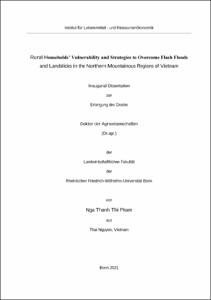Pham, Nga Thanh Thi: Rural Households´ Vulnerability and Strategies to Overcome Flash Floods and Landslides in the Northern Mountainous Regions of Vietnam. - Bonn, 2021. - Dissertation, Rheinische Friedrich-Wilhelms-Universität Bonn.
Online-Ausgabe in bonndoc: https://nbn-resolving.org/urn:nbn:de:hbz:5-63070
Online-Ausgabe in bonndoc: https://nbn-resolving.org/urn:nbn:de:hbz:5-63070
@phdthesis{handle:20.500.11811/9215,
urn: https://nbn-resolving.org/urn:nbn:de:hbz:5-63070,
author = {{Nga Thanh Thi Pham}},
title = {Rural Households´ Vulnerability and Strategies to Overcome Flash Floods and Landslides in the Northern Mountainous Regions of Vietnam},
school = {Rheinische Friedrich-Wilhelms-Universität Bonn},
year = 2021,
month = jul,
note = {Vietnam, situated in South East Asia and dominated by the agricultural sector, is heavily influenced by various types of natural disasters such as floods, flash floods, storms, drought, landslides, and earthquakes. Characterized by a high rate of poverty, marginalization, and limited access to information, production means and resources, the Northern Mountainous Regions are being one of the most prone areas to weather-related events in the country. The regions comprise multiple ethnic minority groups who have deficient levels of education, low income, and inadequate housing systems. Also, local people strongly depend on agriculture as a significant source of income and for daily food demands. As a result, they are highly vulnerable to the impacts of flash floods and landslides that frequently happen in the region. The region has dropped behind other regions in terms of economic development. Against this backdrop, studies should be undertaken in order to provide satisfactory references for policymakers to develop appropriate policies that may help people in such regions recover quickly and sustainably from such climate-related events.
The present study investigates the households´ vulnerability; and evaluates how farmers have perceived and adapted to flash floods and landslides in Van Yen district, Yen Bai province. The research’s findings reveal that most local farmers in the research areas had experienced the impacts of flash floods and landslides over 15 recent years. The majority of respondents did respond to these natural hazards by means of applying adaptation measures to their agricultural activities. Famers also confirmed obstacles hindering their incentives in uptaking adaptation practices, such as a lack of production means and family labor forces, a limitation of knowledge about flash floods and landslides, difficulties in accessing updated climate information, insufficient or limited support from local government, social and cultural barriers, and limited awareness. The findings disclose that the vulnerability of small-scale farmers varies across different communities, depending on the level of adaptive capacity, sensitivity, and exposure. Farmers’ perceptions of flash floods and landslides are associated with socio-economic, psychological, and geographic features. For example, there is evidence that belonging to an ethnic minority group and being a poor household would increase local households’ awareness of flash floods and landslides. Lastly, the research highlights linkages between farmers’ perceptions, socio-economic characteristics, farming features, and institutional conditions with farmers’ preference in selecting adaptation measures regarding flash floods and landslides. Given that findings, the present study would be useful for designing appropriate policy practices in order to enhance farmers’ capacity and resilience toward future natural disasters not only in Vietnam but also in other countries with similar economic, social, and geographical contexts.},
url = {https://hdl.handle.net/20.500.11811/9215}
}
urn: https://nbn-resolving.org/urn:nbn:de:hbz:5-63070,
author = {{Nga Thanh Thi Pham}},
title = {Rural Households´ Vulnerability and Strategies to Overcome Flash Floods and Landslides in the Northern Mountainous Regions of Vietnam},
school = {Rheinische Friedrich-Wilhelms-Universität Bonn},
year = 2021,
month = jul,
note = {Vietnam, situated in South East Asia and dominated by the agricultural sector, is heavily influenced by various types of natural disasters such as floods, flash floods, storms, drought, landslides, and earthquakes. Characterized by a high rate of poverty, marginalization, and limited access to information, production means and resources, the Northern Mountainous Regions are being one of the most prone areas to weather-related events in the country. The regions comprise multiple ethnic minority groups who have deficient levels of education, low income, and inadequate housing systems. Also, local people strongly depend on agriculture as a significant source of income and for daily food demands. As a result, they are highly vulnerable to the impacts of flash floods and landslides that frequently happen in the region. The region has dropped behind other regions in terms of economic development. Against this backdrop, studies should be undertaken in order to provide satisfactory references for policymakers to develop appropriate policies that may help people in such regions recover quickly and sustainably from such climate-related events.
The present study investigates the households´ vulnerability; and evaluates how farmers have perceived and adapted to flash floods and landslides in Van Yen district, Yen Bai province. The research’s findings reveal that most local farmers in the research areas had experienced the impacts of flash floods and landslides over 15 recent years. The majority of respondents did respond to these natural hazards by means of applying adaptation measures to their agricultural activities. Famers also confirmed obstacles hindering their incentives in uptaking adaptation practices, such as a lack of production means and family labor forces, a limitation of knowledge about flash floods and landslides, difficulties in accessing updated climate information, insufficient or limited support from local government, social and cultural barriers, and limited awareness. The findings disclose that the vulnerability of small-scale farmers varies across different communities, depending on the level of adaptive capacity, sensitivity, and exposure. Farmers’ perceptions of flash floods and landslides are associated with socio-economic, psychological, and geographic features. For example, there is evidence that belonging to an ethnic minority group and being a poor household would increase local households’ awareness of flash floods and landslides. Lastly, the research highlights linkages between farmers’ perceptions, socio-economic characteristics, farming features, and institutional conditions with farmers’ preference in selecting adaptation measures regarding flash floods and landslides. Given that findings, the present study would be useful for designing appropriate policy practices in order to enhance farmers’ capacity and resilience toward future natural disasters not only in Vietnam but also in other countries with similar economic, social, and geographical contexts.},
url = {https://hdl.handle.net/20.500.11811/9215}
}






